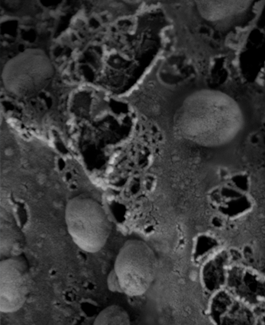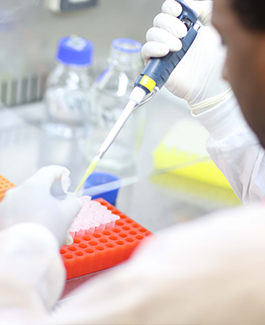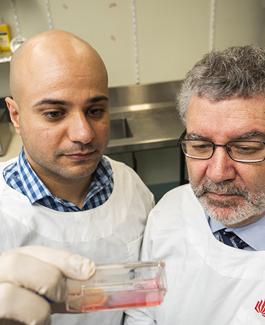Developing next generation gene and cell medicines to treat intractable diseases
Cell and gene therapies are a new frontier in medical innovation—revolutionising the way we think about and treat disease.
We bring together renowned researchers from across the University to investigate and develop new therapies for diseases such as cystic fibrosis, HIV, cancer and rare genetic diseases such as Mucopolysaccharidoses.
Research Highlights

Researchers use novel method to block HIV in mice
New research blocks HIV in mice, paving the way to deliver therapies for other diseases affecting the brain.

Researchers develop direct-acting antiviral therapy to treat COVID-19
A team of international scientists have developed an experimental direct-acting antiviral to treat COVID-19.

Gene-editing breakthrough in battle against cancer
Griffith University researchers have cured cervical cancer in mice using CRISPR gene-editing technology.
Infectious diseases
( COVID-19 , HPV , HTLV-1 , HIV )
Infectious diseases are the cause of pandemics and many deaths worldwide. We are developing new ways to treat infectious diseases to respond rapidly to these new threats.
Expert: Professor Nigel McMillan, Dr Adi Idris
Diseases of the liver
(COPD , emphysema, NASH, cirrhosis)
The liver is our most important organ in our body and replacement via transplant is expensive and not available to all. Our new genetic therapies aim to treat many of these diseases in a more efficient and simple way.
Expert: Professor Kevin Morris
Cystic Fibrosis and MPS1
Cystic Fibrosis is one of the most common genetic diseases caused by a mutation in an important protein required for cells to function. Our team has developed novel treatments to fix this using new genetic technologies and delivery systems.
Expert: Professor Kevin Morris
Delivery of therapies to the brain
The blood-brain barrier stops many treatments reaching the brain. Professor Morris' team has shown how they can turn off HIV in the brain using new natural exosome particles.
Expert: Professor Kevin Morris
Partner with us
Partnerships and collaboration are essential to our research impact. We partner widely with industry, not-for-profit organisations and government. We also collaborate with fellow researchers and maintain strong ties with our community.
If you would like to partner with us, or tap into our research expertise, facilities or services, please get in touch.
Co-lead
Professor Kevin Morris
Professor Morris is an American born scientist who discovered that non-coding RNAs can control gene transcription in human cells when directed to gene promoters.
His research in this field continues to have distinct implications in cancer and gene regulation.
Co-lead
Professor Nigel McMillan
Professor McMillan is a renowned cancer researcher specialising in the infectious causes of cancer.
He is an internationally-recognised expert in the area of human papillomavirus, gene editing and gene silencing. He has over 90 publications and has had continuous NHRMC funding for more than 22 years.
Full members
- Professor Nigel McMillan
- Professor Kevin Morris
- Professor Ming Wei
- Professor Jiri Neuzil
- Associate Professor Jason Peart
- Dr Nic West
- Dr Adi Idris
- Dr Aroon Superamanin (ECR)
- Dr Yaman Tayyar (ECR)
- Dr Shirley Wee
Associate members
- Professor Nan Trung Nguyen
- Professor Chris Stapleburg
- Professor James St John
- Associate Professor Jenny Ekberg
Research candidates and assistants
- Danyelle Assis Ferreira
- Natalie Maria Baptista
- Austin James Brent
- Riccardo Cecchin
- Fahima Chowdhury
- Yusuf Maulana Idres
- Md. Taufiqul Islam
- Farhana Khanam
- Ana Maria Salinas Montalvo
- Paniz Shirmast
- Karen Xu
Contact details
- Phone
- (07) 5678 8811
- Location and postal address
- Menzies Health Institute Queensland
- G40 Griffith Health Centre, Level 8.86
- Gold Coast campus
- Griffith University QLD 4222